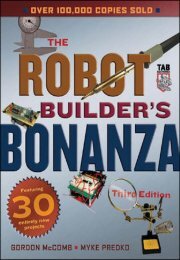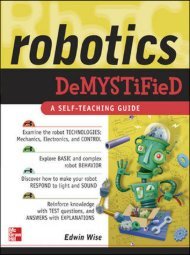- Page 1 and 2:
TLFeBOOK Who Needs Emotions? The Br
- Page 3 and 4:
The Nature of Emotion: Fundamental
- Page 5 and 6:
3 Oxford University Press, Inc., pu
- Page 7 and 8:
vi preface want their computer prog
- Page 9 and 10:
viii preface is required because th
- Page 11 and 12:
x preface prefer to read Part III b
- Page 13 and 14:
xii contents PART III: ROBOTS 7 Aff
- Page 15 and 16:
xiv contributors Jean-Marc Fellous
- Page 17 and 18:
This page intentionally left blank
- Page 19 and 20:
This page intentionally left blank
- Page 21 and 22:
4 perspectives RUSSELL: I confess t
- Page 23 and 24:
6 perspectives EDISON: Tinkering! Y
- Page 25 and 26:
This page intentionally left blank
- Page 27 and 28:
10 perspectives HOW COULD WE TELL I
- Page 29 and 30:
12 perspectives This, of course, ra
- Page 31 and 32:
14 perspectives of a stimulus (e.g.
- Page 33 and 34:
16 perspectives an emotion is neith
- Page 35 and 36:
18 perspectives cognitive processes
- Page 37 and 38:
20 perspectives that they visually
- Page 39 and 40:
22 perspectives A self-model that c
- Page 41 and 42:
24 perspectives Brothers, L. (1997)
- Page 43 and 44:
This page intentionally left blank
- Page 45 and 46:
This page intentionally left blank
- Page 47 and 48:
30 brains specificity and flexibili
- Page 49 and 50:
32 brains It is useful to begin wit
- Page 51 and 52:
34 brains the readout of that syste
- Page 53 and 54:
36 brains A. 5 NH 4Cl Bacteria in c
- Page 55 and 56:
38 brains Although instinctual beha
- Page 57 and 58:
40 brains Motivated behavior requir
- Page 59 and 60:
42 brains emerged through decades o
- Page 61 and 62:
44 brains and gonadal and adrenal s
- Page 63 and 64:
46 brains voluntary control of acti
- Page 65 and 66:
48 brains A. Total cerebral input t
- Page 67 and 68:
50 brains sensory neurons, interneu
- Page 69 and 70:
52 brains functions. Niall (1982) n
- Page 71 and 72:
54 brains motivation arousal necess
- Page 73 and 74:
56 brains serotonergic system is pr
- Page 75 and 76:
58 brains as tree jumping (Doudet e
- Page 77 and 78:
60 brains then have a system that a
- Page 79 and 80:
62 brains heroin and other opiates,
- Page 81 and 82:
64 brains benefits that also presen
- Page 83 and 84:
66 brains and brain neurotransmitte
- Page 85 and 86: 68 brains Cardinaud, B., Gilbert, J
- Page 87 and 88: 70 brains Hess, W. R. (1957). The f
- Page 89 and 90: 72 brains MacLean, P. D. (1990). Th
- Page 91 and 92: 74 brains Pfaus, J. G., Damsma, G.,
- Page 93 and 94: 76 brains trained monkeys: Agonist
- Page 95 and 96: This page intentionally left blank
- Page 97 and 98: 80 brains We conclude by discussing
- Page 99 and 100: 82 brains to prove, theoretical dis
- Page 101 and 102: 84 brains is a mammalian specializa
- Page 103 and 104: 86 brains processing circuits to se
- Page 105 and 106: 88 brains amygdala) and the control
- Page 107 and 108: 90 brains comparison of the amygdal
- Page 109 and 110: 92 brains Is the Amygdala Necessary
- Page 111 and 112: 94 brains the amygdala to determine
- Page 113 and 114: 96 brains The medial prefrontal cor
- Page 115 and 116: 98 brains Many questions remain to
- Page 117 and 118: 100 brains by the amygdala might be
- Page 119 and 120: 102 brains United States, pair up w
- Page 121 and 122: 104 brains networks that participat
- Page 123 and 124: 106 brains Note Portions of this ch
- Page 125 and 126: 108 brains Davidson, R. J., & Irwin
- Page 127 and 128: 110 brains mediate emotional respon
- Page 129 and 130: 112 brains Salinas, J. A. (1995). I
- Page 131 and 132: 114 brains and thalamo-cortico-amyg
- Page 133 and 134: This page intentionally left blank
- Page 135: 118 brains and flexible in the orbi
- Page 139 and 140: 122 brains of the eliciting stimulu
- Page 141 and 142: 124 brains or a right turn to obtai
- Page 143 and 144: 126 brains cortex and basal ganglia
- Page 145 and 146: 128 brains tex of recent (episodic)
- Page 147 and 148: 130 brains the right value in the c
- Page 149 and 150: 132 brains by the process of condit
- Page 151 and 152: 134 brains memories to be held in p
- Page 153 and 154: 136 brains However, it may be expec
- Page 155 and 156: 138 brains Figure 5.4. Some of the
- Page 157 and 158: 140 brains acting through the ventr
- Page 159 and 160: 142 brains (cutting white matter) w
- Page 161 and 162: 144 brains References Alexander, R.
- Page 163 and 164: 146 brains Rolls, E. T. (1999a). Th
- Page 165 and 166: 148 brains directed to us or when t
- Page 167 and 168: 150 brains Specific methods, partly
- Page 169 and 170: 152 brains Movements performed by l
- Page 171 and 172: 154 brains processing of invariant
- Page 173 and 174: 156 brains more about them, their r
- Page 175 and 176: 158 brains see Zajonc, 1985), the i
- Page 177 and 178: 160 brains The question now arises
- Page 179 and 180: 162 brains situations where they ha
- Page 181 and 182: 164 brains Estimation of social con
- Page 183 and 184: 166 brains Davies, M., & Stone, T.
- Page 185 and 186: 168 brains Lhermitte, F. (1983). Ut
- Page 187 and 188:
This page intentionally left blank
- Page 189 and 190:
This page intentionally left blank
- Page 191 and 192:
174 robots perform unanticipated ta
- Page 193 and 194:
176 Table 7.1. Principal Organism F
- Page 195 and 196:
178 robots and cognitive domains. A
- Page 197 and 198:
180 robots that they are better tho
- Page 199 and 200:
182 robots irregularities or discon
- Page 201 and 202:
184 robots 3. A (positive) feeling
- Page 203 and 204:
186 robots We consider the well-est
- Page 205 and 206:
188 robots disturbed by the approac
- Page 207 and 208:
190 robots processing. We view para
- Page 209 and 210:
192 robots independent, a value on
- Page 211 and 212:
194 robots Implications of the Proc
- Page 213 and 214:
196 robots current affective state
- Page 215 and 216:
198 robots primitive fear at the ro
- Page 217 and 218:
200 robots Gray, J. A. (1990). Brai
- Page 219 and 220:
202 robots cesses underlying approa
- Page 221 and 222:
204 robots case of CogAff, conjectu
- Page 223 and 224:
206 robots some cases and in other
- Page 225 and 226:
208 robots DIRECT AND MEDIATED CONT
- Page 227 and 228:
210 robots Toward a Useful Ontology
- Page 229 and 230:
212 robots different varieties of m
- Page 231 and 232:
214 robots Primitive sensors provid
- Page 233 and 234:
216 robots Being in a state P of a
- Page 235 and 236:
218 robots terms of the ability to
- Page 237 and 238:
220 robots Varieties of Affective S
- Page 239 and 240:
222 robots Central Perception Actio
- Page 241 and 242:
224 robots control, where all the l
- Page 243 and 244:
226 robots layer (e.g., observing p
- Page 245 and 246:
228 robots are sometimes unclear, i
- Page 247 and 248:
230 robots for such a fast-acting s
- Page 249 and 250:
232 robots from mental processes ot
- Page 251 and 252:
234 robots The majority view in thi
- Page 253 and 254:
236 robots Will it be a long-term f
- Page 255 and 256:
238 robots or implicitly adopted de
- Page 257 and 258:
240 robots some undesirable emotion
- Page 259 and 260:
242 robots References Albus, J. S.,
- Page 261 and 262:
244 robots Sloman, A. (2001b). Evol
- Page 263 and 264:
246 robots state variables such as
- Page 265 and 266:
248 robots In order to make robots
- Page 267 and 268:
250 robots motivational state also
- Page 269 and 270:
252 robots Prey acquisition: This b
- Page 271 and 272:
254 robots Figure 9.3. Top photos:
- Page 273 and 274:
256 robots especially when young. E
- Page 275 and 276:
258 robots Object of Attachment Saf
- Page 277 and 278:
260 robots Mean distance to attachm
- Page 279 and 280:
262 robots 2003), but the intent is
- Page 281 and 282:
264 robots Affective State Emotion
- Page 283 and 284:
266 robots Motivational/emotional m
- Page 285 and 286:
268 robots Brooks, R. (1986). A rob
- Page 287 and 288:
This page intentionally left blank
- Page 289 and 290:
272 robots responsible for perceivi
- Page 291 and 292:
274 robots species considered to be
- Page 293 and 294:
276 robots This endeavor does not i
- Page 295 and 296:
278 robots For example, the person
- Page 297 and 298:
280 robots mental states (i.e., int
- Page 299 and 300:
282 robots Expression of Affective
- Page 301 and 302:
284 robots Negative valence High ar
- Page 303 and 304:
286 robots and emotion-related proc
- Page 305 and 306:
288 robots For instance, the visual
- Page 307 and 308:
290 robots Undesired stimulus Rejec
- Page 309 and 310:
292 robots intensity: seek or acqui
- Page 311 and 312:
294 robots Table 10.2. Summary of t
- Page 313 and 314:
296 robots it up (Breazeal, 2002b).
- Page 315 and 316:
298 robots pitch, f o (kHz) pitch,
- Page 317 and 318:
300 robots Table 10.3. Overall Clas
- Page 319 and 320:
302 robots Each emotion gateway pro
- Page 321 and 322:
304 robots Biasing Attention Kismet
- Page 323 and 324:
306 robots be to vocalize to the pe
- Page 325 and 326:
308 robots References Ackerman, B.,
- Page 327 and 328:
310 robots Center for the Study of
- Page 329 and 330:
312 robots When team members align
- Page 331 and 332:
314 robots effects that the agent h
- Page 333 and 334:
316 robots double arrow), which imp
- Page 335 and 336:
318 robots that of “robot as avat
- Page 337 and 338:
320 robots terms of specific apprai
- Page 339 and 340:
322 robots their own self-survival
- Page 341 and 342:
324 robots explicit, intended commu
- Page 343 and 344:
326 robots Although, the emotion
- Page 345 and 346:
328 robots planning. In Proceedings
- Page 347 and 348:
This page intentionally left blank
- Page 349 and 350:
This page intentionally left blank
- Page 351 and 352:
334 conclusions handout and pleased
- Page 353 and 354:
336 conclusions emotion. How can we
- Page 355 and 356:
338 conclusions Presumably, the fac
- Page 357 and 358:
340 conclusions Absence of N and N
- Page 359 and 360:
342 conclusions Thus, evolution yie
- Page 361 and 362:
344 conclusions different from such
- Page 363 and 364:
346 conclusions approach to the soc
- Page 365 and 366:
348 conclusions at the much higher
- Page 367 and 368:
350 conclusions mediated by distrib
- Page 369 and 370:
352 conclusions to the prefrontal c
- Page 371 and 372:
354 conclusions pathway of much mor
- Page 373 and 374:
356 conclusions The Motivated Toad
- Page 375 and 376:
358 conclusions explicitly formal r
- Page 377 and 378:
360 conclusions directly and by pro
- Page 379 and 380:
362 conclusions striatum pallidum d
- Page 381 and 382:
364 conclusions (A) Auditory stimul
- Page 383 and 384:
366 conclusions from the primary ta
- Page 385 and 386:
368 conclusions by an interest in u
- Page 387 and 388:
370 conclusions he sees as the stat
- Page 389 and 390:
372 conclusions to detect possible
- Page 391 and 392:
374 conclusions much of my behavior
- Page 393 and 394:
376 conclusions Consider a robot th
- Page 395 and 396:
378 conclusions 3. As already noted
- Page 397 and 398:
380 conclusions Fellous, J.-M., & S
- Page 399 and 400:
382 conclusions Localization of gra
- Page 401 and 402:
This page intentionally left blank
- Page 403 and 404:
386 index amygdala back projection,
- Page 405 and 406:
388 index cognition (continued) evo
- Page 407 and 408:
390 index emotion research (continu
- Page 409 and 410:
392 index fear conditioning (contin
- Page 411 and 412:
394 index limbic system theory, 80-
- Page 413 and 414:
396 index prefrontal cortex and the
- Page 415 and 416:
398 index schema theory and Jackson






